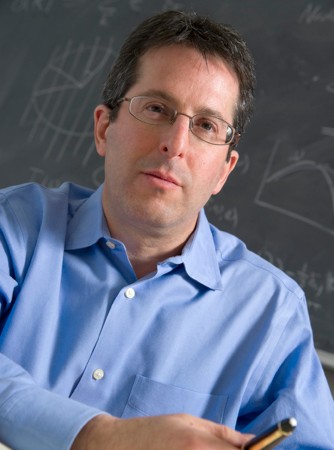Three Johns Hopkins University theoretical physicists have received a $1.3 million grant from the John Templeton Foundation to develop new ideas about the origins of the universe and ways to test those ideas.

Image caption: Marc Kamionkowski
Image credit: Will Kirk / Johns Hopkins University
The grant, awarded last month, will also be used to support a post-doctoral program for young scientists in theoretical research and to create a visitors program to bring notable scientists in the field to the university to collaborate with researchers. The project will be led by Marc Kamionkowski, a professor of cosmology and particle physics in the university's Physics and Astronomy Department. Co-leaders on the project are Alex Szalay and Joseph Silk, also faculty members in the department.
The John Templeton Foundation supports research "relating to the Big Questions of human purpose and ultimate reality."
"The Templeton Foundation is interested in addressing the big questions and I think everyone would agree the beginning of the universe is a big question," Kamionkowski said.
Of particular interest to the researchers is the expansion of the early universe. Current measurements suggest the Big Bang began with inflation, or a period of very rapid expansion, that provided the initial conditions for the evolution of the universe and for the growth of stars, galaxies, and clusters of galaxies within it. The scientists will try to understand the new physics responsible for inflation, what set inflation in motion, and what, if anything, happened before inflation.
The grant, which is for three years, will fund six post-doctoral scientists at the university. Kamionkowski said the first year of the grant will support three current Johns Hopkins cosmology postdocs. This fall, three new post-docs will be recruited to join the program in fall 2014.
"A post-doctoral program is an essential step in the training of a young scientist in physics and astronomy," Kamionkowski said. "Post-docs have the expertise in the field already acquired during graduate school, and they are free of any teaching or committee responsibilities. They can thus focus all their efforts on research."
Kamionkowski, who has mentored more than 20 post-docs, said he welcomes the opportunity to offer more collaborative experiences for young scientists and work with researchers outside of Johns Hopkins.
"Scientists do work collaboratively," he said. "There's this impression that we all lock ourselves away while we're solving some big problem. In reality, we're sort of like jazz musicians, each playing off of each other. This grant will facilitate this type of interaction for a number of scientists."
Posted in Science+Technology
Tagged physics, astronomy, astrophysics, space, alex szalay







